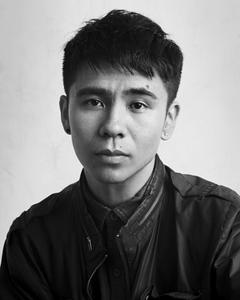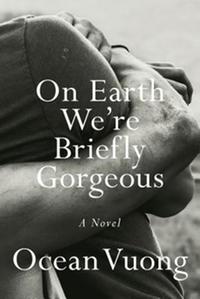
|
|
| photo: Tom Hines | |
Ocean Vuong's book of poetry, Night Sky with Exit Wounds (Copper Canyon), was a New York Times Top 10 Book of 2016 and won the T.S. Eliot Prize, a Whiting Award, the Thom Gunn Award and the Forward Prize for Best First Collection. Vuong's debut novel, On Earth We're Briefly Gorgeous (Penguin Press), is a coming-of-age story set around Hartford, Conn., where the author grew up after his family immigrated from Vietnam. He's currently an assistant professor at UMass-Amherst.
Night Sky with Exit Wounds struck an amazing chord with readers. Did you ever think poetry would make you a rock star?
No. I was happy to have an ISBN and to have a book to show my family, my mother particularly. But, you know, the first thing I learned as a poet: there's no parade in poetry. I was hoping to please my mentors and my friends. That's kind of all I needed. I was the first to go to college in my family and I just wanted to come back to Hartford and say, hey, this is what I've been doing all these years. I knew my mother was going to put the book in her desk at the nail salon where she works and show her customers. She respects writing. She can't do it. She can't read, but she respects books. She had a hunger for that, but the [Vietnam War] interrupted it for her.
Why do you think poetry has become such a lifeline for young people especially?
I came of age under 9/11. There was this great resurgence, and poetry was everywhere. If you see the photos in the subways after the catastrophe, you see sticky notes that covered the tiles. People were writing and sharing poems. When a society is collectively fractured and the floor falls out from beneath us, we need to communicate that chaos, that trauma.
Our daily speech has crowded out the access of an inner life: How's the weather? How are you? Fine. Language is just space filler so that we can move on. Language actually becomes a wall, and we limit the potentiality of understanding our inner lives. Language can be a bridge. But the way we use it shuts us all out from each other and we end up spending years not knowing the people closest to us.
But if someone opens it up, all of a sudden, we realize we're hungry for it. And I think the collective shattering of a catastrophe throws away that veil and you understand that everybody is going through this thing. We have to look to poetry in order to stop talking about the weather.
A lot of this novel feels like your poetry--lyrical and observational. Why did you decide to write this book in prose?
It was an experiment. I told myself if I pick up the pen and it doesn't surprise me, if I sound redundant or I bore myself, I'll quit and go back to poems. The poetry took off in ways that no poet really imagines. Then people start asking: All right, when's the next one; the sophomore book? And they said, you already wrote about American violence, intergenerational trauma, queerness, so you've got to do something else now.
I was honestly terrified of that endeavor because I thought, 85 pages of poems--did that book really exhaust the possibilities of these questions that I spent most of my life asking? I'll never be done asking these questions. If I take these questions--about how American identity forged from violence can heal--into a different genre, will I discover more things?
 And, of course the novel offered new opportunities. In poems, you write a draft--a page, maybe two--and you put it away. And in prose this world doesn't go away. Whether I'm doing dishes, whether I'm going grocery shopping or I'm talking to my friend, the novel never left me. And that was daunting, but also it was a challenge.
And, of course the novel offered new opportunities. In poems, you write a draft--a page, maybe two--and you put it away. And in prose this world doesn't go away. Whether I'm doing dishes, whether I'm going grocery shopping or I'm talking to my friend, the novel never left me. And that was daunting, but also it was a challenge.
A lot of what I couldn't do in the poems was to paint a portrait of people: working-class immigrants that shape New England working-class identity. In my small way, I wanted to salvage that robust and rich and diverse identity.
Are you frequently asked where the line between autobiography and fiction is in your work?
I would like to echo Teju Cole, one of my private heroes. He says for the politicized body--the person of color, the queer person--identity is often co-opted as an agenda or a larger abstracted platform. For the politicized body it's incredibly important to salvage oneself through the personal. I'm also a dog lover, vegan, son, brother, a lover of lavender. That's how we reclaim idiosyncratic life in the midst of a politicized realm. So, I invite the autobiographical knowing.
I go back to an Asian-American American elder, Maxine Hong Kingston. She wanted Woman Warrior to be a great American novel. She wanted to plant her own flag amongst the canon. She wanted to be right up there with Carver and Faulkner. She had this big dream. And the publisher convinced her to just call it a memoir. And I think that happens a lot for writers of color. We are often expected to be merely the conduit of an anthropological truth.
If you were a bookseller who wanted to help readers discover this novel, what kind of shelf talker would you write?
I think it's a story that insists that in between the fractures there's a whole life. I don't know if that sells it, but that's how I would like to present it to the world. You know, you look at a broken vase on the floor and you think, we've got to glue this back together and put this back on the pedestal. But I think hastening to that impulse might be a mistake, particularly when it comes to our history as a country. And this book says, hold on, that space right there between; a whole life can exist there. And if we leave it and honor it, we also have an archive of the breakage and the violence. I haven't been a bookseller so it might be a rookie attempt.
Every time I go to a town, I stop by the local bookstore to re-orient myself. It's my way of knowing who these people are and what's it like here. I've learned that booksellers are the closest thing, in my mind, to educators. As a teacher I'm mapping for my students a reading futurity, or a map forward. They might not know what they could read next based on what they like. You walk into a bookstore and booksellers do the same thing. I learned the phrase handselling and what that meant. It was the most beautiful thing. And I thought, wait a minute, I handsell, too--in the classroom! We're building a future. Those algorithms can only show you where you've been. They can only show your past. You walk into a bookstore and you're walking into the future of your intellectual and cultural life. --Kristianne Huntsberger, writer, storyteller and partnership marketing manager at Shelf Awareness

